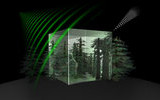How can BIOMASS be used to improve estimates of forest dynamics? (1)
2015-01-28 11:00 - 2015-01-28 12:20
Chairs: Mat Williams, University of Edinburgh / Andreas Huth, Helmholtz Centre of Environmental Research
-
11:00 Forest loss, degradation and fire in the equatorial forests of Southeast Asia -- some recent CIFOR research
Gaveau, David (2); Sheil, Douglas (1); Hergoualc'h, Kris (2) 1: Norwegian University of Life Sciences, Norway; 2: CIFOR, Indonesia
Show abstract
The forests of Southeast Asia have undergone rapid loss and degradation over recent decades. These changes have been associated with large scale fires. These fires have resulted in major episodes of haze in the region with major costs for human health, the regional economy and the environment. Here we will review some recent research by CIFOR looking at quantifying, understanding and addressing these processes in Sumatra and Kalimantan (Borneo). (Research ongoing at time of submission)
-
11:20 Forest Biomass Carbon Changes in China: Knowns and Unknowns
Huang, Yao; Sun, Wenjuan; Chen, Yue Institute of Botany, Chinese Academy of Sciences, China, People's Republic of
Show abstract
Forests cover approximately 31% of the earth’s land area, playing a significant role in climate change mitigation by absorbing carbon from the atmosphere and storing it in biomass and soils. China has a large area of forests, ranking fifth in the most forest-rich countries in the world. Over the last decades, scientists have made great efforts to evaluate forest carbon changes. This presentation provides an overview of forest area, trend in afforestation, and forest carbon storage and changes in China. We highlight the knowledge of changes in forest biomass carbon, unknowns in the rates of forest cover change due principally to regional large-scale afforestation and in age-dependent growth rates for planted forests. These unknowns limit our overall evaluation of terrestrial carbon balance in China. It is expected that BIOMASS can provide above-ground biomass values for the changed forest areas, and thus to chase the changes in biomass and carbon.
-
11:40 Plenary Discussion - BIOMASS
Show abstract
Plenary Discussion - BIOMASS
 In May 2013, the Biomass mission concept was selected to become the next in the series of satellites developed to further our understanding of Earth.
In May 2013, the Biomass mission concept was selected to become the next in the series of satellites developed to further our understanding of Earth.
 REPLAY EARTH EXPLORER 7 USER CONSULTATION MEETING (PART 1)
REPLAY EARTH EXPLORER 7 USER CONSULTATION MEETING (PART 1)
 POLinSAR 2013 Workshop
POLinSAR 2013 Workshop